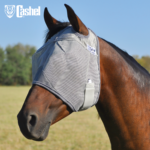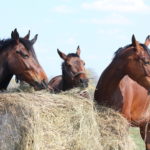The horse’s basic needs for vitamins and minerals don’t change in the winter. What does change are the challenges your horse faces to stay healthy and the quality of his diet, especially if he was primarily on grass.
If your horse is kept in a stall year round, with no grazing, and he’s healthy, you don’t need to make any changes to his diet in the winter beyond increasing his calories.
However, winter can bring to the surface any borderline nutritional deficiencies. A borderline-healthy immune system is likely to show up as allergies to common barn allergens or more frequent respiratory infections. Winter’s extremes can also be hard on feet and skin, so borderline skin and hoof health may predispose the horse to problems.
These tendencies were there in the summer, too, of course. The difference is that summer’s weather conditions weren’t stressful enough for them to cause any truly noticeable health problems.
Horses that spend most of the year grazing have a significant change in their diet when the grass dies. Grass is more digestible than hay because it contains more simple carbohydrates and is 70% water. The water the horse needs for peak digestion is ingested at the same time as he consumes the grass.
Mineral levels in fresh grass and hay are about the same for six months, after which the vitamin A content drops. However, all hay lacks the B and C vitamin content of fresh grass, and fragile essential fatty acids (EFAs) are also lost. And, of course, he’ll have to drink more water with the hay he eats to make up that difference.
To help avoid winter problems, consider giving your horse about 7 grams/day of vitamin C, small amounts of cold-pressed oils or a flaxseed supplement for the EFAs, and extra carrots as a vitamin A boost. Performance horses are likely to benefit from a B vitamin supplement as well.
Also, add one ounce (2 tablespoons) a day of salt to your horse’s feed to help guarantee he drinks enough water to avoid constipation problems. If he has a history of this, or the salt isn’t enough, consider psyllium (see August 2002).
Also With This Article
Click here to view ”Winter Adjustments.”
Click here to view ”Feeding Weanlings.”





